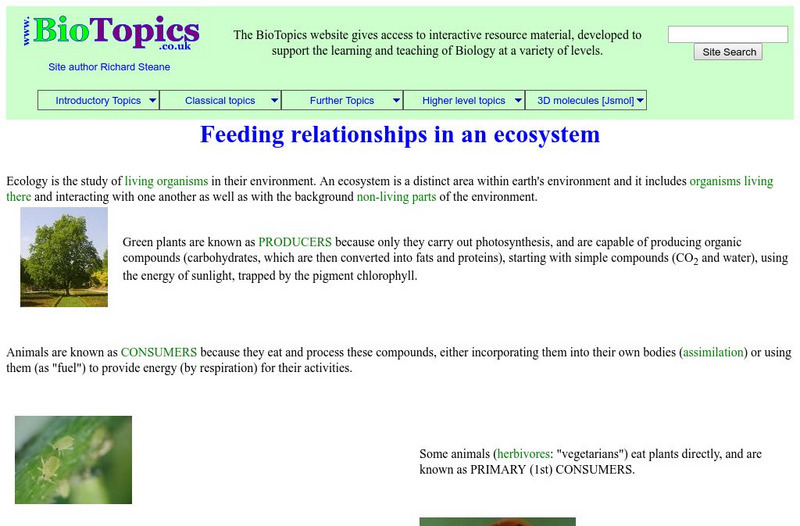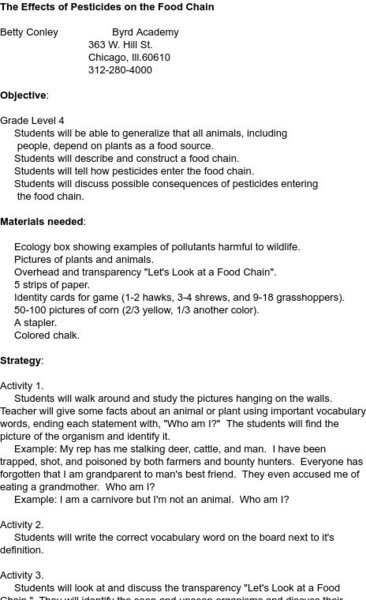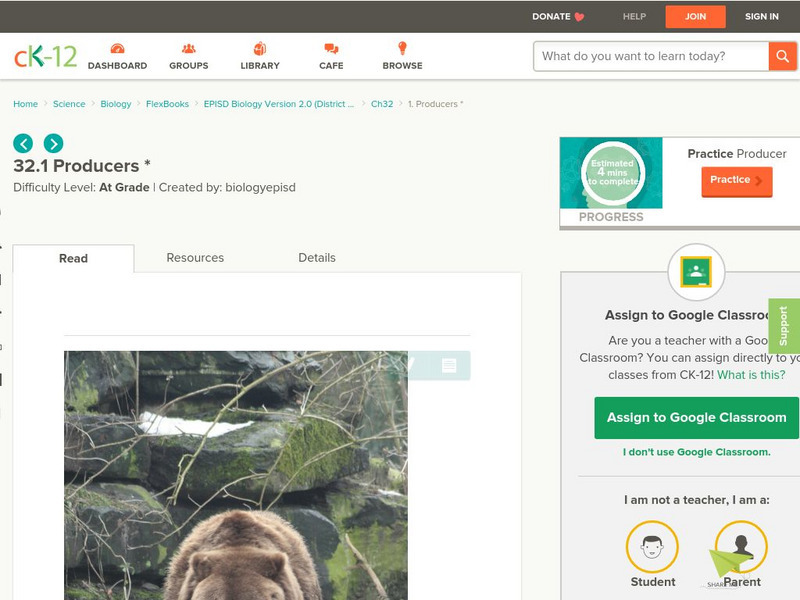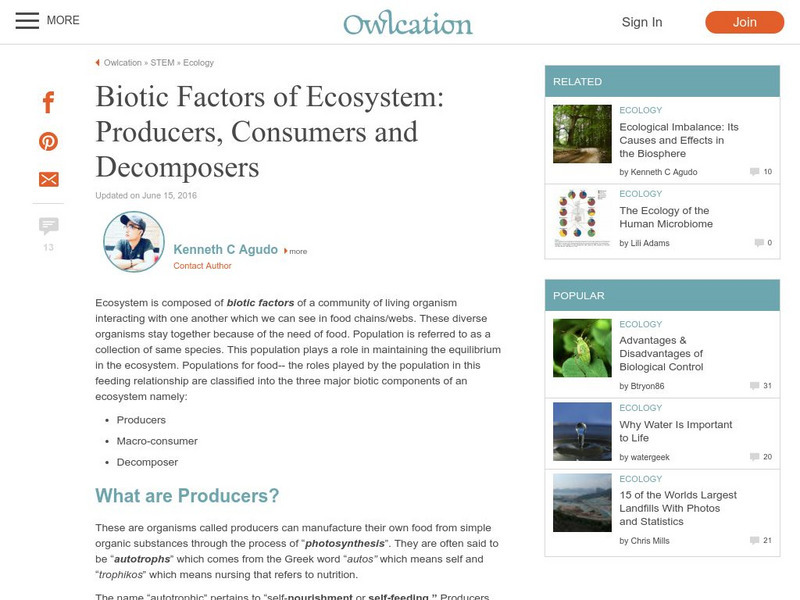CK-12 Foundation
Ck 12: Earth Science: Flow of Energy in Ecosystems
[Free Registration/Login may be required to access all resource tools.] Describes how energy is transfered from one organism to another.
CK-12 Foundation
Ck 12: Earth Science: Flow of Energy in Ecosystems
[Free Registration/Login may be required to access all resource tools.] Describes how energy is transferred from one organism to another.
Polk Brothers Foundation Center for Urban Education at DePaul University
De Paul University: Center for Urban Education: Changing the Ecosystem [Pdf]
"Changing the Ecosystem" is a one page, nonfiction, reading passage about the disruption in the food chain due to habitat loss and pollution and the results of that disruption. It is followed by questions which require students to...
Bio Topics
Bio Topics: Feeding Relationships in an Ecosystem
This overview of feeding relationships illustrates to students the trophic levels of different organisms in an ecosystem. Hover the mouse over different terms to see their definitions.
Science and Mathematics Initiative for Learning Enhancement (SMILE)
Smile: The Effects of Pesticides on the Food Chain
Lesson plan to construct and explain a food chain. Includes games and activities to teach and reinforce concepts.
Other
Explore Learning: Food Chain Gizmo
In this ecosystem consisting of hawks, snakes, rabbits and grass, the population of each species can be studied as part of a food chain. Disease can be introduced for any species, and the number of animals can be increased or decreased...
Science Struck
Science Struck: Facts About the Marine Biome
Describes the characteristics of the marine biome, the plants and animals that live in each of the four ocean zones, coral reefs and estuaries, the climate of the marine biome, and the marine food web.
Shmoop University
Shmoop: Ecosystem Energy Flow
Explains the processes by which energy flows through an ecosystem. Covers the meanings of key vocabulary, e.g., types of producers and consumers, trophic levels, food webs, and the energy pyramid.
Massachusetts Institute of Technology
Mit: Open Course Ware: Courses: Civil Environmental: Ecology I: The Earth System
College-level online course highlighting the fundamentals of ecology. Course topics include coevolution of the biosphere, geosphere, atmosphere, and hydrosphere; photosynthesis and respiration; and the carbon, nitrogen, and water cycles....
Other
The Habitable Planet Simulation
This activity is designed to accompany an interactive on the Annenberg Learner website. Students investigate the changes that take place in an ecosystem when they alter the organisms in a food web. As they work with the simulation, they...
PBS
Pbs Kids: Plum Landing: Can You Dig It?
Set in the Australian desert, players become bilbies to search at night for food while looking out for hungry predators like dingos, foxes, and swooping eagles.
Enchanted Learning
Enchanted Learning: Pond Life Animal Printouts
Filled with printable pages of both plant and animal pond life, Enchanted Learning features fact sheets with color pictures.
CK-12 Foundation
Ck 12: Episd: Producers
[Free Registration/Login may be required to access all resource tools.] Students will recognize and understand the role of producers in the food chain within different ecosystems.
Tramline
Virtual Field Trip: Temperate Forest Biome
Travel with your students on a Virtual Field Trip to learn about Temperate Forest Biomes. You will also discover many informative and interactive websites.
CK-12 Foundation
Ck 12: Life Science: Role of Amphibians
[Free Registration/Login may be required to access all resource tools.] Humans have used amphibians for a number of purposes for thousands of years, if not longer. Amphibians play significant roles in many food webs and are thus an...
Annenberg Foundation
Annenberg Learner: Ecology Lab
Build your own ecosystem, and explore the effects of these interrelationships.
PBS
Pbs Teachers: Predator Protector Game Lesson
Describe the habitat, food web and ecosystem of shark species. Identify threats to sharks and explore how top predators help to maintain the balance of nature within ecosystems. This lesson plan also contains an interactive game.
National Institute of Educational Technologies and Teacher Training (Spain)
Ministerio De Educacion: La Dinamica De Los Ecosistemas
This unit shows how ecosystems change over time and how matter and energy, which are essential to its operation, are transformed and passed from one living thing to another forming, in some cases, authentic cycles. It contains 19...
PBS
Pbs Kids: Plum Landing: Plum's Creature Connector
This PBS Kids activity is an extension of a Plum Landing episode featuring food webs. Students will learn basic information about how animals are interdependent. Students will help different animals survive in their different habitats
Other
Hub Pages: Biotic Factors of Ecosystem: Producers, Consumers and Decomposers
An ecosystem is composed of biotic factors of a community of living organisms interacting with one another which we can see in food chains/webs. These diverse organisms stay together because of the need of food. Population is referred to...
Planet Pals
Planet Pals: Producers
This colorful site examines the food chain and delves into an explanation of what producers are and where they fit in an overall ecosystem.
E-learning for Kids
E Learning for Kids: Science: South Africa: How Do Organisms Get Their Energy?
Join Ellen on her trip to the Kaap De Goede Hoop in South Africa, and learn more about plants, animals, and energy.
Other
The Dirty Dozen Persistent Organic Pollutants
Use this site to learn about the effects of persistent organic pollutants on the ecology of Antarctic coastal waters. Information is presented for both teacher and student researcher.
Georgia Department of Education
Ga Virtual Learning: Biology: Ecology I
A comprehensive ecology learning module where students assess the dependence of all organisms on one another and the flow of energy and matter within their ecosystems.
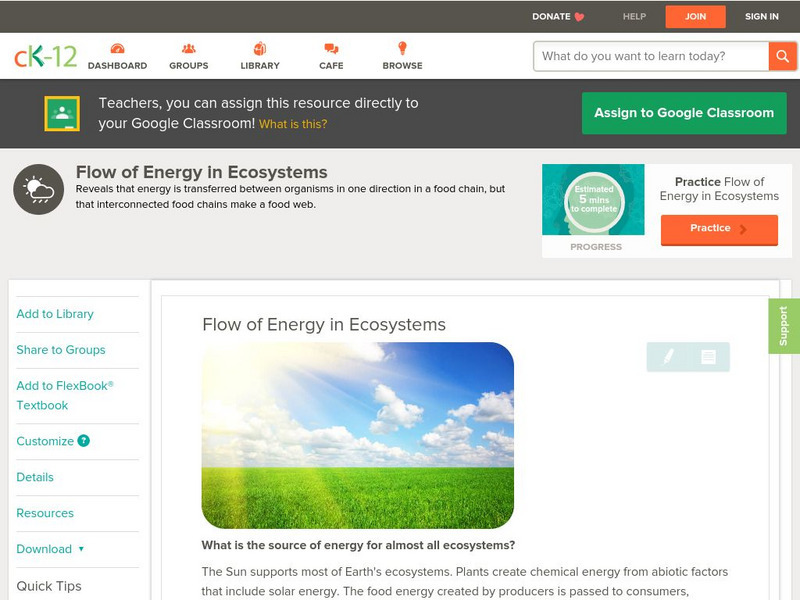
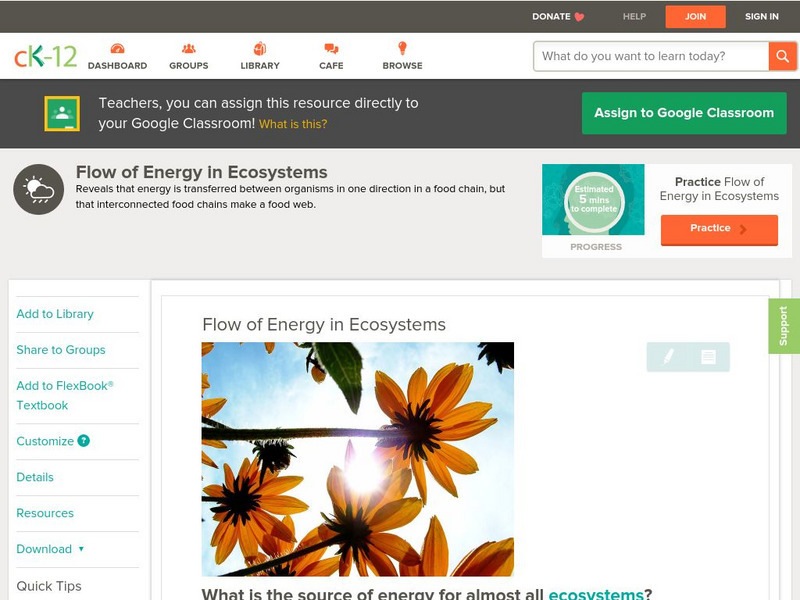
![De Paul University: Center for Urban Education: Changing the Ecosystem [Pdf] Unit Plan De Paul University: Center for Urban Education: Changing the Ecosystem [Pdf] Unit Plan](https://static.lp.lexp.cloud/images/attachment_defaults/resource/large/FPO-knovation.png)
